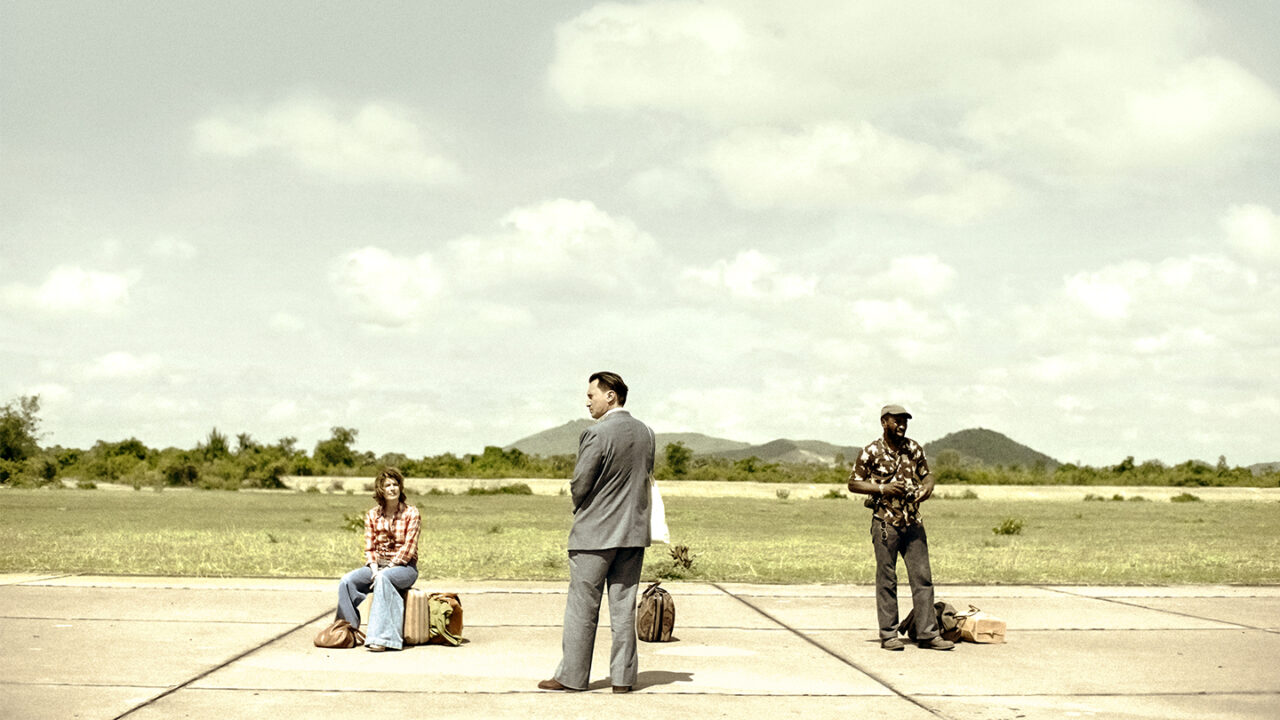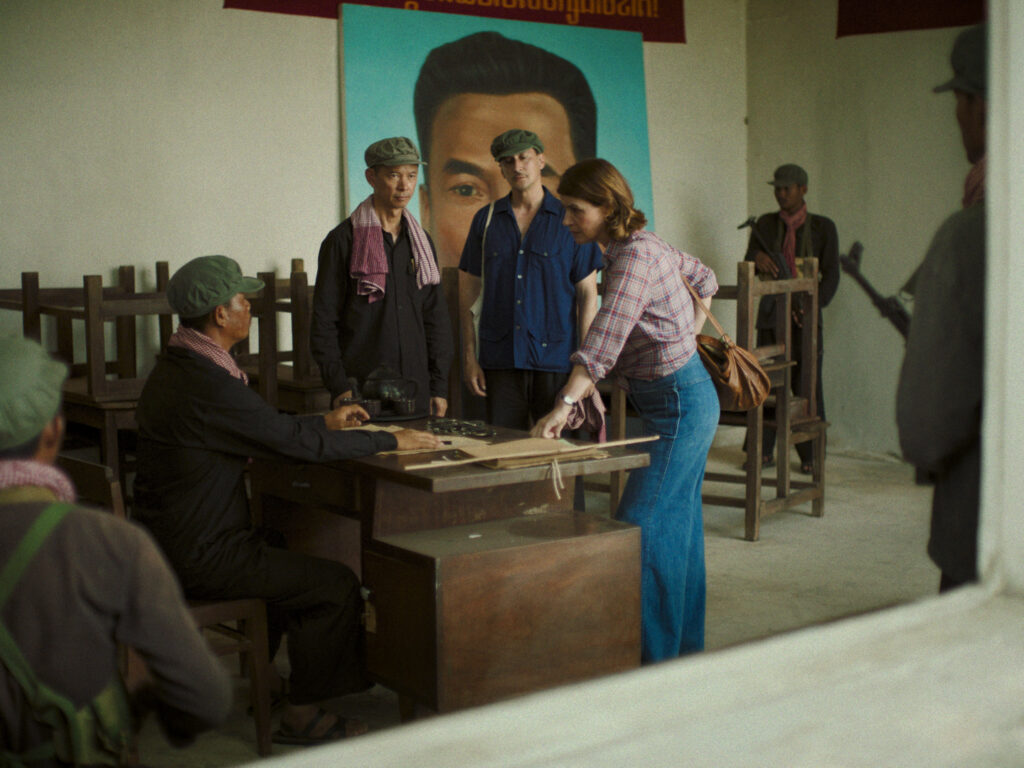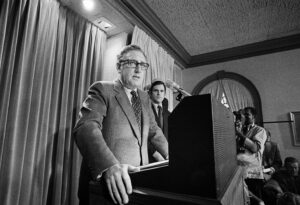Death in Cambodia
An all-star French cast dramatizes a fateful attempt to report on the Khmer Rouge. A scene from “Rendez-vous Avec Pol Pot." (Courtesy of Playtime Group)
A scene from “Rendez-vous Avec Pol Pot." (Courtesy of Playtime Group)
“Rendez-vous Avec Pol Pot” will be released June 5.
In 1978, Washington Post reporter Elizabeth Becker was one of the few Western journalists invited by the Khmer Rouge to witness firsthand the workings of “democratic Kampuchea.” In December of that year, tensions were at their highest as war loomed with neighboring Vietnam. Paranoia was rife following three years of purges and the loss of roughly 2 million lives at the hands of bloodthirsty dictator Pol Pot. Into this fearsome brew dropped Becker along with Scottish journalist and pro-Khmer advocate Malcolm Caldwell, as well as St. Louis Dispatch journalist Richard Dudman. Of the three, two came home alive.
Based on Becker’s book “When the War Was Over,” the new film “Rendez-vous Avec Pol Pot” loosely chronicles the trio’s visit. Lise Delbo (Irène Jacob), Alain Cariou (Grégoire Colin) and Paul Thomas (Cyril Gueï), three fictional characters, stand in for the real deal. Opening scenes show them waiting at an abandoned tarmac in the jungle, wondering if someone will come to meet them and what to do if they don’t. Eventually, soldier-laden trucks arrive along with a classic white Cadillac convertible to take them to their lodgings — a facility with iron-grated doors that lock from the outside.
Their stay includes staged tours of various facilities like a workshop where sloganeering murals are painted and likenesses are carved of Brother #1 (Pot), with a statue slated to replace Wat Phnom in Phnom Penh, the 150-foot stupa symbolizing the Khmer national identity. During a visit to a farm collective, happy workers labor in the fields and feast on spicy stew with beef and fish, although a surreptitious glance at a rice sack (just one of the richly exaggerated seven-ton harvest), shows it filled with husks and dirt. Determined to discover the real Cambodia, Paul ducks out, unattended, into the jungle. Following footpaths to a decimated village, he finds mainly women and children on the brink of starvation.
Episodes depicting carnage like this or historical events are presented either in archival grainy black-and-white imagery, or through the use of dioramas populated with clay likenesses of the cast. Such passages are artfully rendered yet aesthetically jarring, contrapuntally dropping the audience into scenes that have the childlike feel of animation. There’s an argument to be made that the horror of the sequences is accentuated by the tonal shift, but it mainly comes off as an effort to stay within the movie’s obviously limited budget.

Paul’s absence sets off a panic among the Khmer guards, but he returns of his own accord and things settle down until he goes missing again. The trio’s minder, Camarade Sung (portrayed by Bun-Hok Lim in an indelible performance), assures Lise and Alain that he must have wandered off again, only to be captured by the Vietnamese. The two journalists know this isn’t true, but with no way of investigating, return to idly tapping at keyboards or revisiting the airstrip where they first landed.
Jacob, known for modern French classics like “Three Colors: Red” and “The Double Life of Véronique,” is a two-time Cesar nominee for those films, and a Cannes Best Actress winner for the latter. Her presence here firmly anchors the cast, but she, like Colin and Gueï, is given little to do but anxiously wait and fearfully obey orders.
An old friend of Pot’s, Alain is a true believer, swallowing the lies they’re told without question. His acquiescence pays off when both are granted a visit with Brother #1 in his palace in Phnom Penh. Another trip through the diorama in the classic Cadillac lands the cast in the deserted royal compound in a deserted city, its splendor no match for the eerie emptiness.
What ought to be a climactic moment is instead a rambling digression by Pot, filmed in shadow, exclaiming the virtues of the Khmer Rouge and cursing Western forces for their lies and oppression. Sparks fly when Lise insists on the whereabouts of their disappeared colleague, but her queries go unanswered.
In real life, Dudman, the character depicted by Gueï, did not go missing. But Caldwell (depicted by Colin) did, after he was granted a one-on-one meeting with Pot. He returned to the guesthouse in a mood Becker described as “euphoric.” Later that night, she was awakened by the sound of gunfire. Stepping out of her room, she encountered an armed Cambodian man who aimed his pistol at her. As she retreated into her room, she heard movement and more gunshots. An hour later, she was informed that Caldwell was dead. In his quarters, she and Dudman found him shot in the chest, along with the body of a Cambodian man.
As the one closest to Pot and an advocate for his bloody regime, the reasons for his killing are unclear in the movie and in life. At the time, the Observer noted: “Certainly there must have been some kind of in-house involvement, as the guests were guarded. But who instructed the guards, and why they did so, remains a subject of speculation.”
With its use of archival materials, a documentary on the subject might have been a better choice.
Caldwell’s family members believe he was killed on the orders of Pol Pot, perhaps over a disagreement during their meeting. British intelligence services also concluded that “Pol had ordered Caldwell’s death.”
The film’s loose grip on the facts does little to heighten the drama; nor does it shed greater light on the regime’s war crimes. Cambodian filmmaker Rithy Panh experienced firsthand the horrors of the Khmer Rouge when his family was expelled from Phnom Penh in 1975. Imprisoned in a remote labor camp in rural Cambodia, he witnessed his parents, sisters and nephews each succumb to starvation and exhaustion before he escaped to Thailand.
His first documentary feature, “Site 2,” about a family of Cambodian refugees in a camp on the Thai-Cambodian border in the 1980s, won the “Grand Prix du Documentaire” at the Festival of Amiens. In 1994, his “Rice People” played at Cannes and was submitted for the Best Foreign Language Film Oscar, a first for a Cambodian. His 2013 documentary, “The Missing Picture,” was nominated for an Oscar, and “Rendez-vous Avec Pol Pot” was Cambodia’s official entry for last year’s Academy Award but didn’t make the shortlist.
With a filmography dedicated to revealing the horrific history of his homeland, Panh’s passion for his subject is indisputable. But whether to tell a story as a feature film or documentary is not an arbitrary decision. The characters in “Rendez-vous Avec Pol Pot” are powerless and are therefore acted upon rather than driving the action, and passive protagonists rarely make for compelling drama. Character depth and motivation are minimal, and faint new light is shed on the horrors of the Khmer Rouge. Audiences are left with little more to do than shake their heads and declare the shame of it.
With its use of archival materials, a documentary on the subject might have been a better choice. But with so little to add to the conversation, that, too, is debatable. Unless adding to the conversation is less important than simply continuing it. Many remain unaware of what happened in Cambodia during those fateful years, and while the record is filled with books and movies analyzing the atrocities, maybe a new film with one of France’s biggest stars can elicit interest from those who need to know what happens when autocrats get their way.
Dig, Root, GrowThis year, we’re all on shaky ground, and the need for independent journalism has never been greater. A new administration is openly attacking free press — and the stakes couldn’t be higher.
Your support is more than a donation. It helps us dig deeper into hidden truths, root out corruption and misinformation, and grow an informed, resilient community.
Independent journalism like Truthdig doesn't just report the news — it helps cultivate a better future.
Your tax-deductible gift powers fearless reporting and uncompromising analysis. Together, we can protect democracy and expose the stories that must be told.
Dig. Root. Grow. Cultivate a better future.
Donate today.






You need to be a supporter to comment.
There are currently no responses to this article.
Be the first to respond.